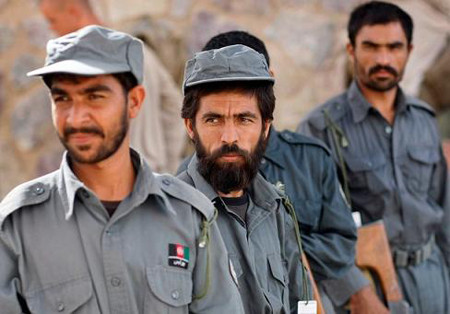By Ben Farmer

The Telegraph, Jun. 21, 2011: Residents and officials warn that the rush to recruit local defence forces around Kandahar following the arrival of last year's surge of American troops had given rise to poorly-controlled armed gangs. They listed armed robberies, thefts and assaults by the militias, saying the groups had become the main worry of many residents in the province's rural districts. (Photo: Getty Images)
Residents and officials warn that the rush to recruit local defence forces around Kandahar following the arrival of last year's surge of American troops had given rise to poorly-controlled armed gangs.
They listed armed robberies, thefts and assaults by the militias, saying the groups had become the main worry of many residents in the province's rural districts.
Nato commanders have long sought to harness against the Taliban the Pashtun tradition of raising local defence forces, or Arbakai, in time of need.
Proponents argue their knowledge of local people and terrain makes them formidable against an enemy that to foreign soldiers is indistinguishable from the local population.
Making villages responsible for their own security also eases the burden on stretched Nato and conventional Afghan forces.
The strategy has been adopted several times in recent years, only to be abandoned amid fears the militias were ungovernable and were empowering local strongmen against the government.
Gen David Petraeus, senior Nato commander in Afghanistan, is a firm supporter of the idea's latest guise, called the Afghan Local Police (ALP).
So far 6,200 officers have been recruited with a target of 30,000 by the end of the year. The ALP are chosen and commanded by Afghan authorities, but paid for and trained by the United States.
They are supposed to be uniformed, but many residents said militiamen were operating in civilian clothes before they had formally joined the ALP.
Arzomand Sab, a 55-year-old farmer from Arghandab district of Kandahar, told the Daily Telegraph a militia of 55 men had been recruited in January to patrol his village, and three others.
"Their main job is to prevent the insurgents from entering the area, but they don't do their job, they just beat people and insult people and make problems for us," he said.
He said the ALP had been recruited along tribal lines by Kandahar's former police chief and had recently beaten up a trader and mullah from other tribes, causing villagers to protest at their brutality.
He said they had so far kept insurgents from his village, but were alienating the residents.
Many Afghans view the forces as a throwback to the civil war when warlords maintained their own marauding private armies. They are also a reminder of Russian-backed militias which operated around Kandahar in the late 1980s.
Gul Mohammad, a 47-year-old farmer from Lako Kheyl in western Zhari district, said a trader in livestock had been arrested nearby by the force a month ago.
"They put him in their custody. They killed him and his body was found in a stream. He was going to Helmand to buy sheep. He had $10,000 dollars (£6,250) on him and they took it.
"If there were no Americans in the area, these people would steal our turbans."
Both the United Nations and Oxfam have expressed concern about the ALP.
Haji Mohammad Ehsan, deputy leader of Kandahar's provincial council, said: "Yes, these things are happening. We hope we can improve this and stop these abuses as we continue. For the past 30 years we Afghan people have suffered from this."
Engineer Abdul Qadr, director of the Afghanistan Independent Human Rights Commission in Kandahar, said the freedom of the ALP was attracting the less disciplined members of the more formal Afghan National Police.
He said: "The Arbakai are also a good source of corruption. The money is being divided up and used by strongmen."
Meanwhile Robert Gates, US defence secretary, confirmed America had been in contact with the Taliban in recent weeks, but warned peace discussions were "very preliminary at this point".
"My own view is that real reconciliation talks are not likely to be able to make any substantive headway until at least this winter," he said.
"I think that the Taliban have to feel themselves under military pressure, and begin to believe that they can't win before they're willing to have a serious conversation."



